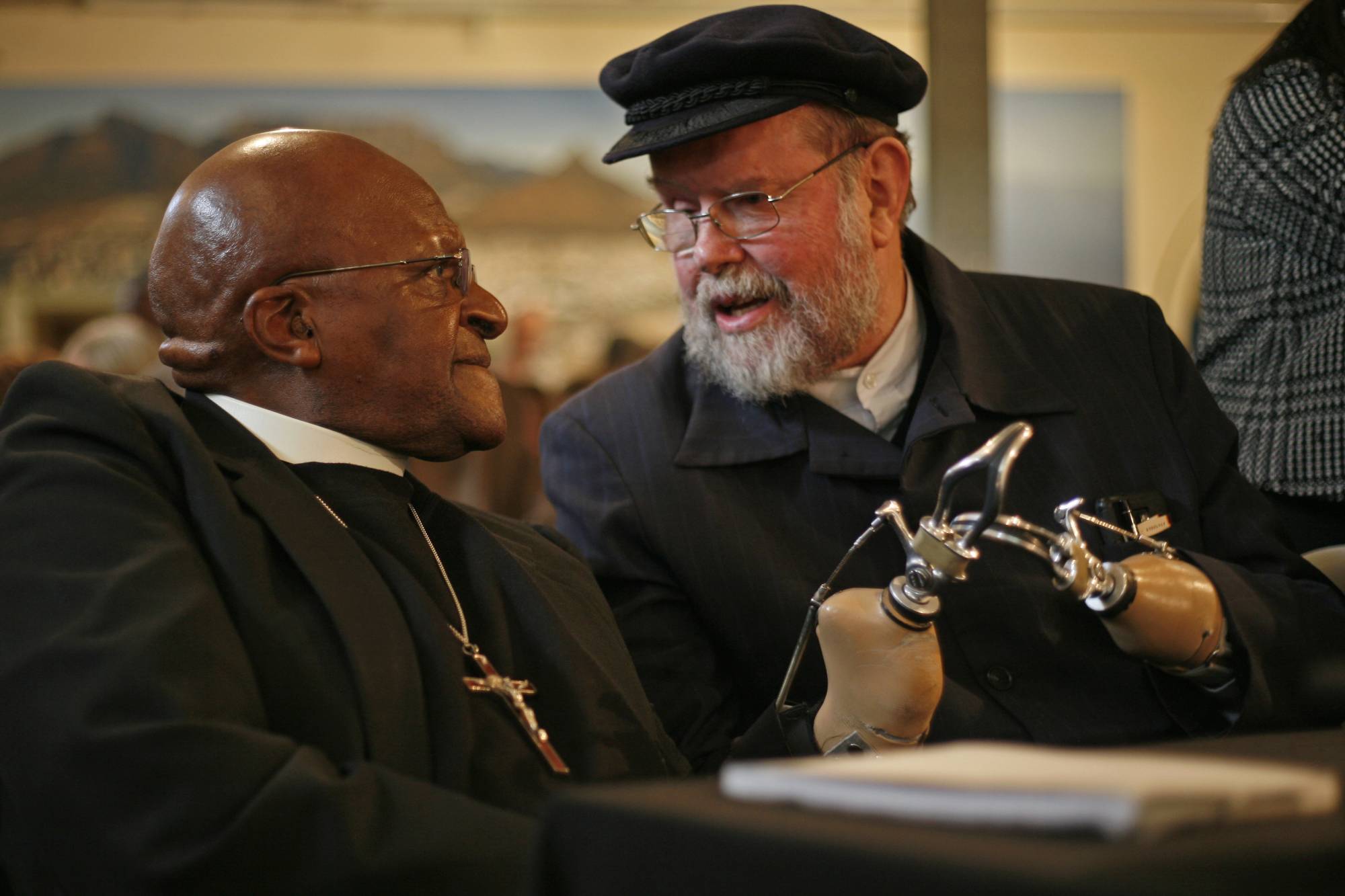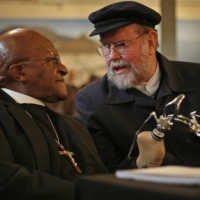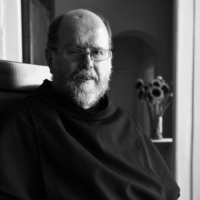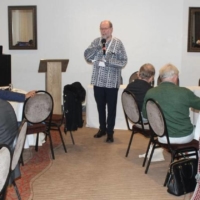This year, the 39th Niwano Peace Prize will be awarded to Father Michael Lapsley, Society of the Sacred Mission, of South Africa in recognition of his relentless struggle against apartheid and social discrimination, his support for the liberation movement in South Africa and various peace-building activities in other parts of the world.
Lapsley’s nonviolent, multifaith peace-building efforts and activities of healing based on the restorative justice approach, dialogue and reconciliation continue to contribute to the healing of South Africans, as well as many others all over the world. He has contributed immensely to the cause of peace and interreligious cooperation, which is in congruence with the mission of the Niwano Peace Prize.
“The news that I was to be awarded Niwano Peace Prize took me by total surprise,” Lapsley wrote in his acceptance letter. “I am humbled and honoured to accept the prize. Whilst you are awarding this prize to me, in so doing you honour not just me but the many collectives of which I am part.”
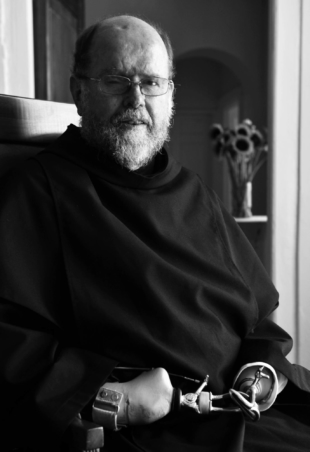
“Father Lapsley, as a religious leader and a global social activist, has called upon faith communities to reflect and acknowledge social discrimination within their societies and mobilized their support against racism, apartheid and all forms of social discrimination that prevails in different parts of the world. The exceptional aspect of his social activism is that he has not restricted himself to addressing the socioeconomic and political basis of racism, but has also emphasized on the process of healing to deal with the bitterness, racial hatred and other sociopsychological impacts of injustices that emerge out of social discriminations,” wrote Ranjana Mukhopadhyaya, chair of the Niwano Peace Prize Committee.
To avoid undue emphasis on any particular religion or region, every year the Niwano Peace Foundation solicits nominations from people of recognized intellectual and religious stature around the world. In the nomination process, some 600 people and organizations, representing 125 countries and many religions, are asked to propose candidates. Nominations are rigorously screened by the committee, which was set up in May of 2003 on the occasion of the 20th anniversary of the Niwano Peace Prize. The committee presently consists of nine religious leaders from various parts of the world, all of whom are involved in movements for peace and interreligious cooperation.
The presentation ceremony will take place in Tokyo on Tuesday. In addition to an award certificate, Lapsley will receive a medal and ¥20 million.
Stand against apartheid
Lapsley was born in New Zealand on June 2, 1949. In 1971 he joined the Anglican religious order the Society of the Sacred Mission and in 1973 was ordained to the priesthood in Australia.
In 1973, he arrived in Durban, South Africa, as an undergraduate student. Soon thereafter, during the height of apartheid repression, he became chaplain to students at both black and white university campuses in Durban. In 1976, he began to speak out on behalf of schoolchildren who were being shot, detained and tortured.
In 1976, the year of the Soweto uprising that sparked protests across the country, Lapsley took a stand in his role as national chaplain to Anglican students, the position he held at the time. Because of this he was expelled from the country in September. He went to live in Lesotho, where he continued his studies and became a member of the African National Congress and a chaplain to the organization in exile. During this period he traveled the world, mobilizing faith communities, in particular, to oppose apartheid and support the liberation struggle.
In 1982, after a police raid in Maseru in which 42 people were killed, he moved to Zimbabwe. In 1990, three months after ANC leader Nelson Mandela’s release from prison, he was sent a letter bomb by the apartheid regime. It was hidden inside two religious magazines. He lost both hands and the sight in one eye in the blast and was seriously burned. In 1992, on his return to South Africa, he helped to start the Friends of Cuba association and later became its first national president. He was awarded the Cuban Friendship Medal by the Cuban Council of State.
Quest for healing, justice
In 1993, he became chaplain of the Trauma Centre for Victims of Violence and Torture in Cape Town, which assisted the country’s Truth and Reconciliation Commission. This work led to the establishment of the Institute for Healing of Memories in Cape Town in 1998. The IHOM aims to allow many more South Africans to tell their stories in workshops where they work through their trauma. The IHOM is based in Cape Town, but Lapsley has also worked in many other countries in Africa and across the world. The organization now works with groups including those affected by political violence; those affected and infected by HIV and AIDS; refugees and asylum seekers; prisoners; and war veterans. The IHOM is also a nonprofit organization in the U.S. and Luxembourg, and Lapsley now serves as president of the larger Healing of Memories Global Network.
Global mission
After recognizing that racism was not confined to South Africa alone, Lapsley did not restrict himself within his country and chose to move globally. In addition to the Friends of Cuba, his efforts also include creating the International Network for Peace, along with the families of those killed in the 9/11 attacks in the U.S., to promote effective and nonviolent solutions to terrorism.
Lapsley has written two books, “Neutrality or Co-option?: Anglican Church and State from 1964 Until the Independence of Zimbabwe” (Mambo Press, Gweru, Zimbabwe, 1986), and “Redeeming the Past: My Journey from Freedom Fighter to Healer” (Orbis, New York, 2012). “Redeeming the Past” has been translated in 13 languages, including Japanese.
Lapsley draws his spirituality from his reflections on injustice, pain and suffering caused by social inequalities that he witnessed around him and this led him to seek justice for all based on his understanding of the Bible. Therefore, while being rooted in Christianity, his appeal has been universal and interfaith.
“Humanity and Mother Earth is in need of healing,” Lapsley wrote in his acceptance letter. “Today, this Prize acknowledges that healing the wounds of the past is essential for the world to live in peace. The work of the Niwano Peace Foundation is a sign of hope. It bears witness to the truth that a peaceful future for humanity is an interfaith future where all faiths and cultures are reverenced and respected.”
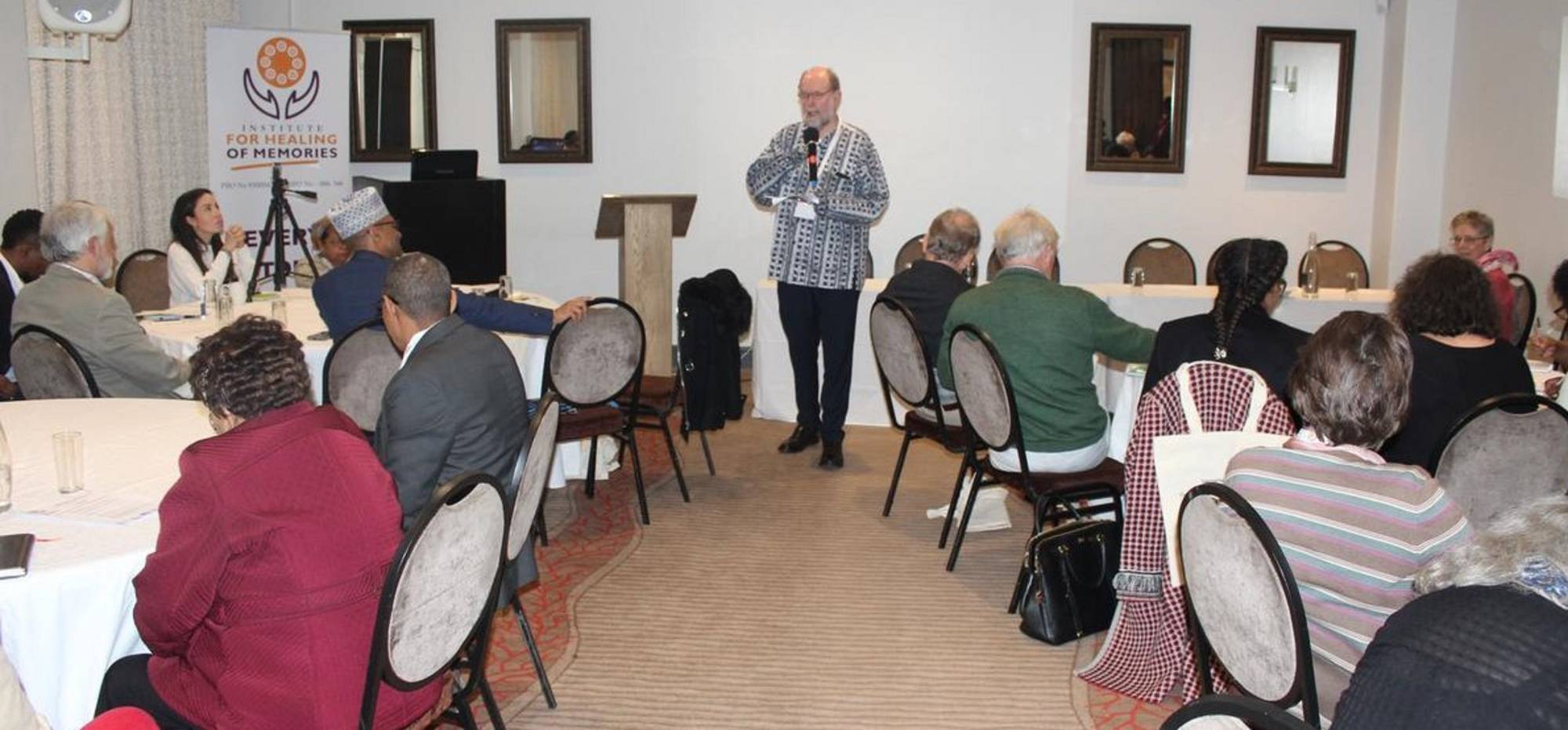
Annual award recognizes endeavors that aim to ease suffering through interreligious cooperation
The Niwano Peace Foundation established the Niwano Peace Prize to honor and encourage individuals and organizations that have contributed significantly to interreligious cooperation, thereby furthering the cause of world peace, and to make their achievements as widely known as possible.
The foundation hopes in this way to enhance interreligious understanding and cooperation and encourage the emergence of still more people devoted to working for world peace.
The prize is named in honor of the founder and first president of the lay Buddhist organization Rissho Kosei-kai, Nikkyo Niwano. For Niwano, peace was not merely an absence of conflict among nations, but a dynamic harmony in the inner lives of people, as well as in our communities, nations and the world.
Niwano Peace Prize recipients
2021 Shih Chao-hwei
2020 Pomnyun
2019 John Paul Lederach
2018 Adyan Foundation
2017 Munib A. Younan
2016 Centre for Peace Building and Reconciliation
2015 Esther Abimiku Ibanga
2014 Dena Merriam
2013 Gunnar Stalsett
2012 Rosalina Tuyuc Velasquez
2011 Sulak Sivaraksa
2010 Ela Ramesh Bhatt
2009 Gideon Baguma Byamugisha
2008 Prince El Hassan bin Talal
2007 Cheng Yen
2006 Rabbis for Human Rights
2005 Hans Kung
2004 The Acholi Religious Leaders’ Peace Initiative
2003 Priscilla Elworthy
2002 Samuel Ruiz Garcia
2001 Elias Chacour
2000 Kang Won-yong
1999 The Community of Sant’Egidio
1998 Maha Ghosananda
1997 The Corrymeela Community
1996 Marii K. Hasegawa
1995 M. Aram
1994 Paulo Evaristo Arns
1993 Neve Shalom/Wahat al-Salam
1992 A.T. Ariyaratne
1991 Hildegard Goss-Mayr
1990 Norman Cousins
1989 Etai Yamada
1987 The World Muslim Congress
1986 Philip A. Potter
1985 Zhao Puchu
1984 Homer A. Jack
1983 Helder P. Camara



